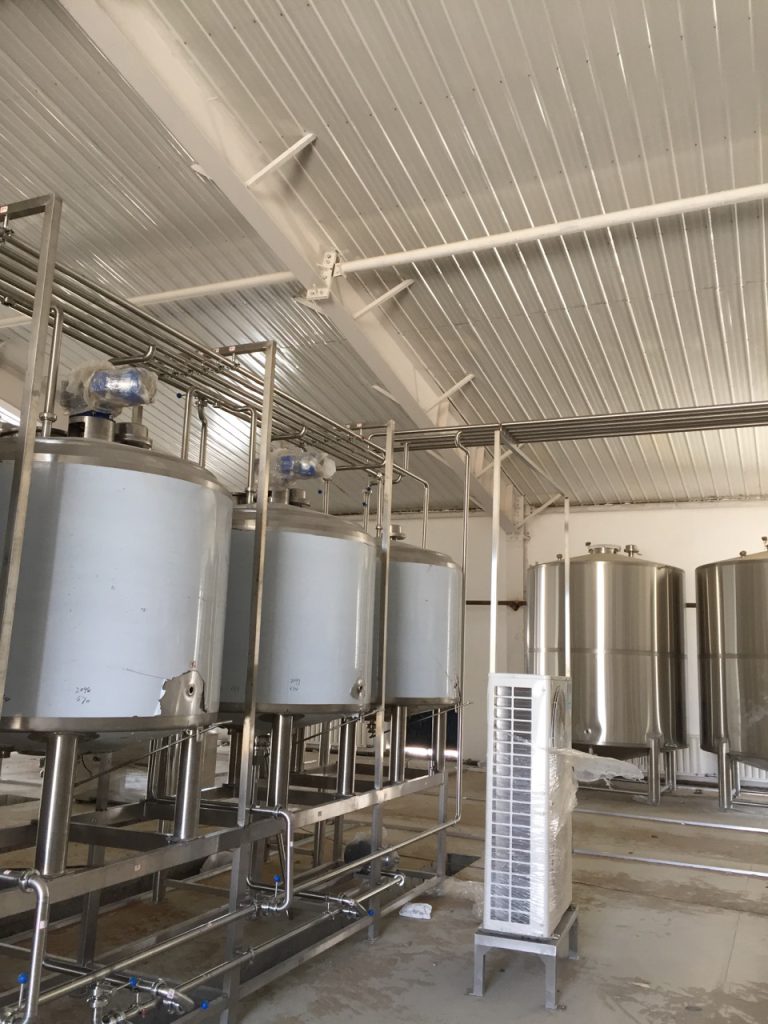Introduction

Milk is a highly perishable and nutritious food product that requires careful handling and storage to maintain its quality and safety. Improper storage can lead to bacterial growth, spoilage, and loss of nutritional value. In the dairy industry, stainless steel milk tanks have become the gold standard for storing milk due to their numerous advantages. This blog post will delve into the various benefits of using stainless steel milk tanks, covering aspects from hygiene and durability to cost-effectiveness and environmental impact, providing a comprehensive overview for dairy farmers, processors, and anyone involved in milk handling.
Hygienic Imperative: Stainless Steel Milk Tanks and Food Safety
Ensuring Milk Purity with Stainless Steel
Maintaining the highest standards of hygiene is paramount in milk storage. Contaminated milk can pose serious health risks to consumers. Stainless steel is a non-reactive material that does not leach into the milk, ensuring its purity and preventing contamination. The smooth, non-porous surface of stainless steel milk tanks makes them easy to clean and sanitize, minimizing the risk of bacterial growth and ensuring food safety. This is crucial for meeting regulatory requirements and maintaining consumer trust.
Preventing Bacterial Growth with Easy-to-Clean Surfaces
The smooth surface of stainless milk tanks makes them easy to clean and sanitize, preventing bacterial growth and ensuring the safety of the milk. Unlike porous materials, stainless steel doesn’t harbor bacteria in crevices. Regular cleaning and sterilization are essential to maintain the quality and safety of the milk, and stainless steel simplifies this process. This contributes to a longer shelf life for the milk and reduces the risk of spoilage.
Durability and Longevity: Stainless Steel Milk Tanks as a Long-Term Investment
A Robust and Reliable Solution
Stainless steel is a highly durable material that can withstand the rigors of daily use in the dairy industry. These tanks are often subjected to frequent cleaning, temperature fluctuations, and the weight of large volumes of milk. Stainless milk tanks are resistant to corrosion, rust, and other forms of damage, ensuring a long lifespan and a reliable storage solution for milk. This robust nature minimizes downtime and replacement costs.
Protecting Your Milk from Contamination
The corrosion resistance of stainless steel milk tanks is crucial in preventing contamination and maintaining the quality of the milk. Milk contains natural acids that can corrode some materials. Stainless steel is highly resistant to acids and other corrosive substances, ensuring that the milk remains safe and uncontaminated. This resistance also prevents metallic flavors from leaching into the milk, preserving its taste.
Cost-Effectiveness: Stainless Steel Milk Tanks as a Money-Saving Solution
Long-Term Savings with Durable Stainless Milk Tanks
While the initial investment in stainless milk tanks may be higher compared to other materials, their durability and longevity make them a cost-effective solution in the long run. The extended lifespan of stainless steel tanks means fewer replacements and less capital expenditure over time. Stainless milk tanks require minimal maintenance and have a long lifespan, reducing the need for frequent replacements and repairs. This translates to significant savings for dairy businesses.
Reducing Maintenance Costs with Stainless Milk Tanks
The low maintenance requirements of stainless milk tanks contribute to their cost-effectiveness. Cleaning is straightforward, and the material’s resistance to corrosion minimizes the need for repairs. Stainless steel is easy to clean and requires minimal upkeep, reducing the time and resources needed for maintenance. This frees up staff to focus on other essential tasks within the dairy operation.
Versatility and Adaptability: Stainless Steel Milk Tanks for Various Applications

Stainless Steel Milk Tanks: Adaptable to Different Dairy Operations
Stainless steel milk tanks are available in various sizes and configurations, making them suitable for different dairy operations. Whether you’re a small family farm or a large-scale processing plant, there’s a tank designed to fit your needs. Whether you are a small-scale dairy farmer or a large-scale milk processor, you can find a stainless steel milk tank that meets your specific needs. This flexibility makes them a valuable asset for any dairy business.
Customizable Stainless Steel Milk Tanks for Specific Needs
Many manufacturers offer customizable stainless steel milk tanks to meet specific requirements. You can tailor the tank to fit your available space and processing workflow. You can choose the size, shape, and features of your milk tank to ensure it fits seamlessly into your dairy operation. This level of customization ensures optimal efficiency and integration within your existing setup.
Conclusion
Stainless steel milk tanks offer a multitude of benefits, making them an indispensable asset in the dairy industry. They are a cornerstone of modern milk handling practices. From ensuring hygiene and durability to promoting cost-effectiveness and environmental sustainability, stainless steel milk tanks provide a reliable and efficient solution for milk storage. By investing in stainless steel milk tanks, dairy farmers and processors can ensure the quality and safety of their milk while contributing to a sustainable future. This investment is not just good for business; it’s good for the environment and consumers.
FAQ
What is the average lifespan of a stainless steel milk tank?
With proper maintenance, a stainless steel milk tank can last for several decades, making it a long-term investment for your dairy operation. Regular cleaning and inspections can further extend its lifespan.
How do I clean and sanitize a stainless steel milk tank?
Cleaning and sanitizing a stainless steel milk tank involves rinsing it with water, followed by a thorough cleaning with a food-grade detergent. It’s important to use cleaning agents that are compatible with stainless steel. After cleaning, the tank should be sanitized using a suitable sanitizing solution. Always follow the manufacturer’s recommendations for cleaning and sanitizing procedures.
Are stainless steel milk tanks suitable for storing other liquids?
While primarily used for storing milk, stainless steel tanks can also be used for storing other liquids, such as water, juice, and other food-grade liquids. However, it’s important to ensure that the tank is properly cleaned and sanitized before switching between different liquids.

